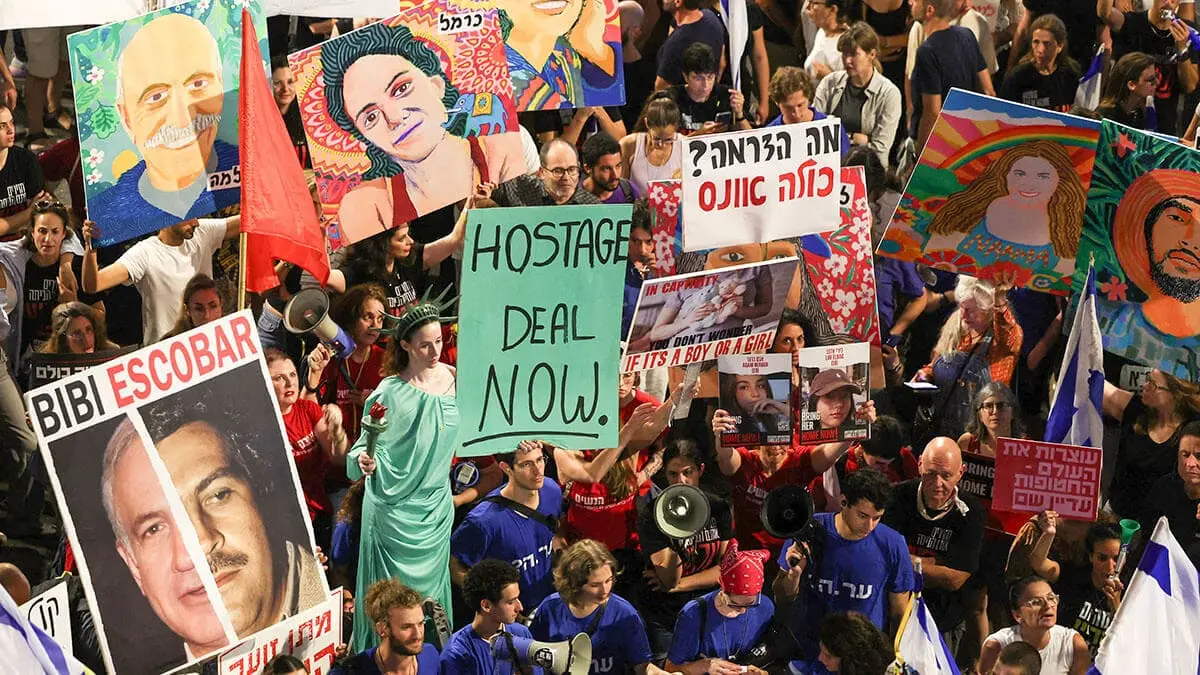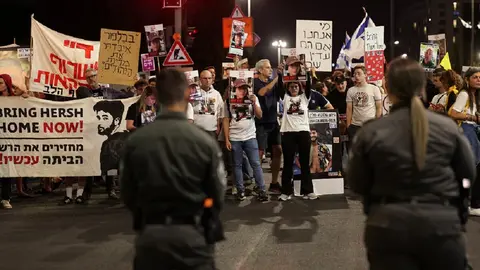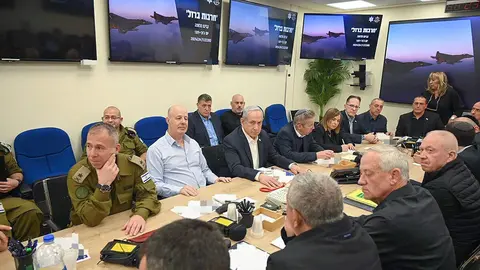Israel announces the death of four hostages as pressure mounts on government to accept truce deal

- Biden calls on Qatar to press Hamas to accept deal
- The Hamas leader in Gaza is in no hurry to end the war
- Hezbollah intensifies attacks on northern Israel, setting numerous fires
Israel Defence Forces spokesman Rear Admiral Daniel Hagari announced the deaths of hostages Chaim Peri, Amiram Cooper, Yoram Metzger and Nadav Popplewell, who were kidnapped by Hamas during the 7 October terrorist attack.
Utterly shattering. We have now leared that 4 hostages were murdered in Gaza. They are:
— Aviva Klompas (@AvivaKlompas) June 3, 2024
💔 Chaim Peri
💔 Yoram Metzger
💔 Amiram Cooper
💔 Nadav Popplewell
Chaim Peri, 80, from Kibbutz Nir Oz was abducted from the safe room in his home while protecting his wife.
Nadav… pic.twitter.com/zt2ntCEEth
The deceased, some of them founders of their respective kibbutzim and peace activists, were abducted with their wives - in the case of Nadav Popplewell, with his mother - although they were released during the November truce. They have also all appeared alive in Hamas propaganda videos in recent months.
Another hostage murdered in Hamas captivity! Nadav Popplewell from Kibbutz Nirim was murdered by Hamas in Gaza. Nadav was kidnapped on October 7 together with his mother Hana Perry who was returned in the hostage deal. Nadav’s brother was murdered that on October 7th. Nadav was… pic.twitter.com/sxkpPZ0foM
— יוסף חדאד - Yoseph Haddad (@YosephHaddad) June 3, 2024
Following the IDF spokesman's press conference, the Hostages' Families Forum issued a statement expressing its “anguish” at the news. ‘It should shock every citizen of the State of Israel and provoke a profound examination of conscience in every leader,’ the association said.
Haim Peri was a father, a husband, a grandfather, and a peace activist.
— Peace Now (@peacenowisrael) June 3, 2024
Haim promoted Israeli-Palestinian coexistence and peace and volunteered with Road to Recovery, transporting sick children from Gaza for medical treatment.
May his memory be a blessing for peace. pic.twitter.com/keNwy6TJu0
Likewise, the families of the abductees have again demanded that the Israeli government accept the truce agreement recently presented by the United States. ‘It is time to end this cycle of sacrifice and abandonment. Their murder in captivity is a disgrace and a sad reflection of the importance of delaying previous agreements,’ the statement said.
US President Joe Biden on Friday publicly announced a proposal for a ceasefire in Gaza that would also include the gradual release of hostages. This plan has caused rifts within the Israeli government, with far-right members threatening to overthrow the coalition if Prime Minister Benjamin Netanyahu accepts it.
💥Every damn day: Spontaneous protests in from of IDF HQ in Tel Aviv. "Deal! NOW!" Also, Ra'anana. Rehovot. (Lior Segev; Yael Gadot; Danor Aharon.) pic.twitter.com/DcCyP44XhU
— Noga Tarnopolsky נגה טרנופולסקי نوغا ترنوبولسكي (@NTarnopolsky) June 3, 2024
Since then, protests in Israel have intensified to pressure the government to accept the proposal, which would allow the release and return home of the more than 100 hostages held hostage, as well as the possibility of a dignified burial for the dead whose bodies are still in Gaza.
Washington's three-phase plan would end the conflict in Gaza, free all hostages and allow for the reconstruction of the devastated Palestinian enclave without Hamas in power.
Citizens held a spontaneous protest in Tel Aviv march chanting: "We will not forsake them! We will not abandon them!"
— Or-ly Barlev in English 🎗 (@OrlyBarlevEng) June 3, 2024
Banner: "The government abandoned them, the people will bring them back!" pic.twitter.com/fvKEvqo0zT
Biden calls on Qatar to press Hamas to accept deal
In the words of US President Joe Biden, Israel is prepared to move forward with the proposal, as he conveyed to Qatari Emir Tamim bin Hamad Al Thani, whom he asked to press Hamas to accept the plan as well.
According to the White House, Biden ‘confirmed Israel's willingness to move forward with the terms now offered to Hamas’ and ‘urged [the emir] to use all appropriate measures to secure Hamas's acceptance of the agreement’.
Everyone who wants peace now must raise their voices and let the leaders of Hamas know they should take the proposed deal, work to make the proposal real and lasting, and forge a better future out of this tragic war. pic.twitter.com/gRo6Umjdfr
— The White House (@WhiteHouse) June 1, 2024
Washington is again pressing Doha, which is home to many Hamas leaders, to take a tougher stance against the terrorist group in order to secure the release of the hostages. Last April, Secretary of State Antony Blinken privately called on Qatari Prime Minister Mohamed Al-Thani to expel Hamas leaders if they continued to reject the agreements.
For their part, other countries in the region, including Saudi Arabia, Jordan, the United Arab Emirates and Egypt have endorsed the US proposal, saying it is important to approach it in a ‘serious and positive’ way.
Israel has now offered a roadmap to an enduring ceasefire – and the release of all the hostages.
— President Biden (@POTUS) May 31, 2024
Yesterday, this proposal was transmitted by Qatar to Hamas.
Today, I want to lay out its terms for the world. pic.twitter.com/0cdypBP9wb
The Foreign Ministers of these countries and Qatar met virtually to discuss the proposal and mediation efforts by Washington, Doha and Cairo for an agreement to exchange Israeli hostages and Palestinian prisoners to allow a permanent ceasefire and more humanitarian aid into Gaza.
The ministers stressed the need to halt the Israeli military operation in Gaza, end the humanitarian crisis and allow displaced persons to return home. They also stressed the implementation of the two-state solution, which includes an independent and sovereign Palestinian state similar to that of 4 June 1967 with East Jerusalem as its capital.
Today I spoke with Amir Sheikh Tamim Bin Hamad Al-Thani of Qatar to discuss how the ceasefire and hostage deal offers a concrete roadmap for ending the crisis in Gaza.
— President Biden (@POTUS) June 4, 2024
I urged Amir Tamim to use all appropriate measures to secure Hamas’ acceptance of the deal and thanked him…
The Hamas leader in Gaza is in no hurry to end the war
For the plan to go ahead, however, it needs the approval of Hamas leaders, who are already awaiting a detailed proposal for the deal, Arab mediators told The Wall Street Journal.
The US newspaper says the terrorist group wants a deal that does not allow Israel to resume war after the hostages are released, something Jerusalem has repeatedly rejected.
Hamas chief Yahya Sinwar is in no hurry to end the war, says the @WSJ. He thinks that while Israel is turning into a pariah, the Palestinian cause is being revived, according to messages he has sent to Arab mediators.
— Lazar Berman (@Lazar_Berman) June 3, 2024
Likewise, Hamas leader in Gaza, Yahya Sinwar, told Arab mediators that he is ‘in no hurry to end the war’, believing that the conflict is isolating Israel internationally and advancing the Palestinian cause.
By contrast, Hamas's political leaders in exile want an end to the war ‘provided that an agreement guarantees the group's survival and grants it a continued role in Gaza's government’.
This is a home in Rafah that Hamas has booby-trapped. Just one out of many examples where Hamas embeds itself within civilian population and infrastructure.
— Israel Defense Forces (@IDF) June 1, 2024
Our forces are continuing intelligence-based targeted operations in the Rafah area, locating stocked weapons storage… pic.twitter.com/VBnxFYls2b
Hezbollah intensifies attacks on northern Israel, setting numerous fires
In recent days, the Islamic Republic of Iran-backed Lebanese Shi'ite group Hezbollah has stepped up its attacks on northern Israel, setting fires in places such as Kiryat Shemona, a border town that has been largely uninhabited due to Hezbollah's constant attacks since October.
Dramatic scenes in Israel's north as Hezbollah just launched a kamikaze drone from Lebanon into the Israeli city of Kiryat Shmona.
— Hen Mazzig (@HenMazzig) June 3, 2024
Residential areas are on fire across the North of Israel, with huge fires erupting from bombs attached to the drones or falling debris.
Children… pic.twitter.com/TzzKJLBObY
As a result of these actions, thousands of people in northern Israel have been forced to leave their homes, to which they have been unable to return for the past 8 months.
The few remaining residents and local authorities have demanded that the government take strong measures to restore security in the area while far-right ministers are calling for a direct war with Lebanon, something Jerusalem has tried to avoid in recent months due to the ongoing conflict in Gaza.
More than a dozen fires across Northern Israel caused by rocket fire from the Iranian proxy - the terrorist group Hezbollah.
— David Collier (@mishtal) June 3, 2024
Israel is under constant attack from these radical Islamic terrorists.
Something your pro Hamas western media is forgetting to tell you. pic.twitter.com/G3UvHDvf4w
According to the Israel Nature and Parks Authority, the recent spate of rocket and drone attacks in recent days caused forest fires that consumed more than 2,470 hectares in open areas, including nature reserves, reports The Times of Israel.










